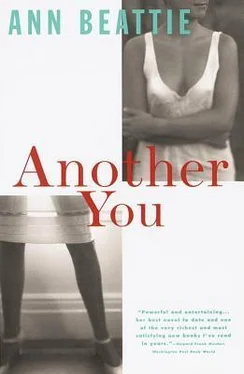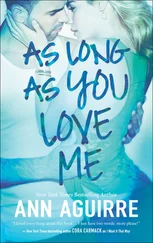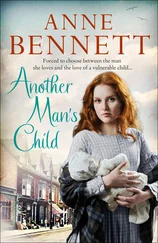Ann Beattie - Another You
Здесь есть возможность читать онлайн «Ann Beattie - Another You» весь текст электронной книги совершенно бесплатно (целиком полную версию без сокращений). В некоторых случаях можно слушать аудио, скачать через торрент в формате fb2 и присутствует краткое содержание. Год выпуска: 2014, Издательство: Vintage Books, Жанр: Современная проза, на английском языке. Описание произведения, (предисловие) а так же отзывы посетителей доступны на портале библиотеки ЛибКат.
- Название:Another You
- Автор:
- Издательство:Vintage Books
- Жанр:
- Год:2014
- ISBN:нет данных
- Рейтинг книги:5 / 5. Голосов: 1
-
Избранное:Добавить в избранное
- Отзывы:
-
Ваша оценка:
- 100
- 1
- 2
- 3
- 4
- 5
Another You: краткое содержание, описание и аннотация
Предлагаем к чтению аннотацию, описание, краткое содержание или предисловие (зависит от того, что написал сам автор книги «Another You»). Если вы не нашли необходимую информацию о книге — напишите в комментариях, мы постараемся отыскать её.
Another You — читать онлайн бесплатно полную книгу (весь текст) целиком
Ниже представлен текст книги, разбитый по страницам. Система сохранения места последней прочитанной страницы, позволяет с удобством читать онлайн бесплатно книгу «Another You», без необходимости каждый раз заново искать на чём Вы остановились. Поставьте закладку, и сможете в любой момент перейти на страницу, на которой закончили чтение.
Интервал:
Закладка:
Marshall nodded. He would just as soon not hear these things about Gordon.
“Maybe a lot was expected of him when he was young,” Beth said. “It was that way with my older brother. I have an older brother, too. He works for a conservation group in Africa. He’d do anything for an animal, but he doesn’t even send my mother a birthday card. Sometimes a postcard, but there’s never much information on it. She was going to visit him once, and he told her there were too many diseases, not to come.”
“He was probably telling her for her own sake,” Marshall said.
“Men stick together, they really do.” She sighed. “I don’t even believe that you believe that.”
“I don’t,” Marshall said.
“I like you,” she said again. She looked around. “I was thinking about getting a few ficus, or something like that. Do you think there’s enough greenery, or would more look nice?”
“It looks perfect to me, but I’m not very good at envisioning things when they aren’t in place.”
“Hmm,” she said. “Gordon’s very good at that, usually. You know what he does? He gets a piece of paper and he draws polka dots on it. He says doing that allows him to envision what things will look like before he breaks his back moving everything.”
He nodded.
“Did he tell you about the letters?”
“Letters?” He had been thinking about ficus trees. Were ficus the ones with small, wrinkly leaves? The ones they sold sometimes in the supermarket in New Hampshire?
“He didn’t tell you,” she said, matter-of-factly. “I don’t suppose I thought he really had.” She slid forward, placing her feet together, the beer bottle half-empty. “Don’t tell him I told you,” she said.
“What about letters?” he said.
“The nurse. That woman, who was so nice. She called to say they’d be coming. I really shouldn’t tell you this, because you almost got the letters. Evie was going to give them to Sonja and you until just before she died. She changed her mind, the nurse said, and wanted them to be sent to me and Gordon. I hardly knew her, so she was sending them to Gordon, not to me.”
He frowned.
“Don’t tell him,” she said again.
“Okay,” he said.
“Well, she called to say how sorry she was, but to say she’d heard from the nurses at the hospital that she didn’t die a painful death, and all of that. Gordon told her we’d see her at the funeral. I was going to go. If he went, I was going to go with him. Anyway, the nurse was calling to say she was sending the things by Federal Express, because she didn’t feel right about putting jewelry in the mail and just mailing it. I told Gordon he should send some money to reimburse her, that that was probably what she was hinting about. Well, she did send it. This necklace was in its original box, from a jewelry store in Boston. I kept the box, because it’s beautiful too. I started to read the letters, but I didn’t understand anything in them. Sort of business letters, about somebody’s delayed arrival. They were boring, to tell you the truth. I put them aside and thought maybe I’d look at them again some other time, and then Gordon got home from work and started reading them. They were in three packages, tied with ribbon. He read about half of one pack and then he said, ‘You know, the truth of the matter is, I don’t much like surprises.’ He doesn’t, either. He likes to know in advance what I’m getting him for his birthday. He told me right out, when I hardly knew him, that if I ever gave him a surprise party, he’d never speak to me again. I wish you’d gotten the letters, because then I could find out if that stuff meant anything. I saw them and they didn’t look like love letters. I think he was just teasing. But he didn’t like having them, so do you know what he did? He took them with him when he made a night dive. He and his buddy went out together, and when he went down he tucked the whole pile of them under a rock on the bottom of the ocean. Littering the Atlantic! At first I thought he was kidding me, but then it turns out to be true. He took a bunch of her old letters and drowned them.”
“Jesus,” Marshall said. He remembered, now, the box the nurse had brought with her to the house the day of the funeral. With the exception of the necklace, Evie had given Sonja the entire contents of her jewel box. His father’s pocket watch had been in there. Sonja had given that to him. It seemed almost obscene that Tony Hembley had looked at it admiringly — that he had stood in the living room, joining the little cluster of Sonja and Marshall and the nurse, and peered into the pink satin jewel box and looked appreciatively at the watch Sonja drew out, his father’s octagonal watch dangling from its platinum watch fob. The nurse had done just what Evie had asked. Her timing might have been better, but he supposed that if someone other than Tony had gazed in, he wouldn’t feel so cantankerous. It was hardly a private matter, really: a box filled with an old lady’s brooches and rings, bracelets and necklaces, costume jewelry with only a few precious stones dropped in among the tangle, Sonja had told him later. It wasn’t as if the Hope diamond were hiding in there.
“I think maybe it made him sentimental,” Beth said. “Letters from so long ago.”
A bird began to shriek, its piercing cries making Beth spring up, grabbing the top of the fence and hissing at a cat that had begun to prowl the bird’s cage in the neighbors’ yard. “They hooked up some electronic thing that was supposed to keep that cat ten feet from the birdcage,” Beth said. “It works all day until late afternoon, and then I just don’t know. The cat’s right in there like there was nothing set up at all.” Next came a recorded voice, as he watched her, white-knuckled, clinging to the fence. “You have entered a secured area,” the voice said. “Oh, fuck you,” Beth said to the recording. “If I didn’t grab the fence and hiss, that three-hundred-dollar bird would be dead, and that would be a very happy alley cat.”
“Where are the people?” he said.
“Oh, they don’t ever do anything about their hair-trigger alarm. They’re probably inside smoking dope.”
“Really?” he said.
“Oh, I don’t know. The owners keep going back and forth between here and Boca Raton, and they’ve got some Rastas staying in there who don’t care about anything but dope and sunshine. Why they’d leave the bird that way, I don’t know. The guy really likes the bird. He’s out there every evening he’s home, trying to get it to say things.”
“What does it say?” Marshall said.
“It says ‘Margaritaville’ and ‘tropical breeze’ and things like that. Now it says ‘good weed.’ His girlfriend’s the one who rented to the Rastas. Now he’s gonna be furious at her.”
“Hey, beauty!” the bird hollered. “Helloooooooo.”
“I save your life every day. Can you say, ‘Save my life?’ ” Beth hollered.
Silence from the bird.
“I do,” she said.
Marshall sloshed the last inch of beer around in the bottle. He could see living this way: blue skies; warm winters; flowers.
“Hey, Marsh!” Gordon hollered, appearing at the end of the long hallway. He was backlit, just a shape, his features indistinguishable as Marshall went toward him. Gordon embraced him one-armed; the other held a bag of charcoal and a string bag dangling from his thumb, filled with things from the store.
“Hey, I hope the party didn’t keep you away last night. You didn’t check into a motel just because those idiots hadn’t cleared out, did you?”
“No, no,” Marshall said. Gordon smelled of alcohol. Beth stood smiling at him, having picked up both empty beer bottles.
“Corona, babe?” she said.
Читать дальшеИнтервал:
Закладка:
Похожие книги на «Another You»
Представляем Вашему вниманию похожие книги на «Another You» списком для выбора. Мы отобрали схожую по названию и смыслу литературу в надежде предоставить читателям больше вариантов отыскать новые, интересные, ещё непрочитанные произведения.
Обсуждение, отзывы о книге «Another You» и просто собственные мнения читателей. Оставьте ваши комментарии, напишите, что Вы думаете о произведении, его смысле или главных героях. Укажите что конкретно понравилось, а что нет, и почему Вы так считаете.












